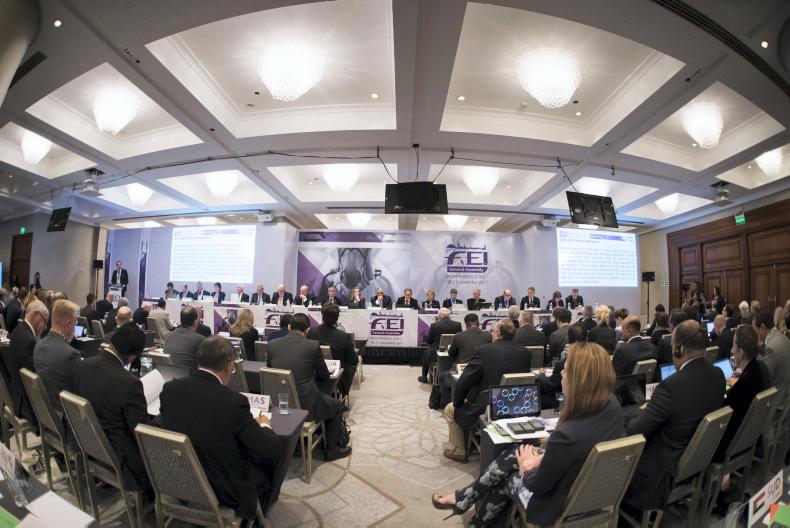THE financial affairs of the FEI are in a very positive state, it was outlined at this week’s FEI General Assembly in Montevideo, Uruguay.
Presenting the audited financial statements for 2016 to the National Federations at the Assembly on Tuesday, FEI chief financial officer Claude Praz told the delegates that strict expense control and a conservative budgeting approach in operational revenues resulted in an exceptional surplus CHF 6.8 million (€5.8m) for the FEI last year.
As the FEI is a not-for-profit organisation, CHF 5.5 million (€4.7m) of this surplus was put back into the sport. Two million of that revenue went to prize money for the Nations Cup final in Barcelona in September, prior to the announcement that Longines were coming on board as the title sponsor from 2018.
Another CHF 1.7 million (€1.4m) went to the FEI Solidarity Fund, the FEI’s global sports development programme which was launched in 2011. A further CHF 1.4 million (€1.1m) went to promoting increased Equine Anti-Doping and Controlled Medication Program (EADMCP) controls and further develop human anti-doping, while CHF 400,000 (€342,000) was put back into IT.
Chair of the audit and compliance committee, Ireland’s Brian Mangan, said: “You will see from the report, it was a very good result for the last year with many improvements which will help to secure the future of the organisation.
“We were very pleased that our President (Ingmar De Vos) became a member of the governance task force of the Association of Summer Olympic International Federations, and our involvement with this task force led to a questionnaire which was completed by the FEI and produced a very satisfactory outcome relative to other international federations.”
HORSE SPORT IRELAND
CEO of Horse Sport Ireland Ronan Murphy travelled to Montevideo to represent the Irish federation at the General Assembly and commented: “Preparations for the FEI General Assembly begins each year when the FEI rule modifications are circulated by the FEI in mid to late July. These changes are circulated to stakeholders such as High Performance committees, HP directors, HP managers, athlete reps, vets, affiliates, coaches, judges and National Federation officials, all of which are invited to comment.
“This year the proposed changes were also circulated to the respective rider representatives to ensure that riders’ opinions are gathered via the appointed representative,” Murphy added.
INVITE SYSTEM
The CSI invitation system in show jumping has been a hot topic of discussion over the last year and was finally voted on after being suspended in May of this year due to concerns raised at the FEI Sports Forum in Lausanne.
Outgoing Vice President and chair of the jumping committee John Madden guided the delegates through the voting process, whereby the 60/20/20 invitation system was approved, with just 32 of the 134 Nations Federations voting against.
The rule states that for CSI shows, 60% of the riders must come from the Longines ranking list (in desending order), 20% must be selected by the host national federation and 20% are made up of invitations by the organising committee.
“The FEI is completely committed to looking very carefully how this affects the athletes, organisers and all stakesholders, and to how if affects the rankings, and is committed to perfect this and evaluate it over time,” Madden said on Tuesday.
The Assembly also voted on the phasing out of performance enhancing hind boots, which caused considerable discussion, proposing that only hind boots used soley for protective purposes be used in FEI competition.
This rule was approved by majority and will be phased in, taking the Olympic qualification cycle into consideration and kicking into action on January 1st 2021 for all FEI competition, with earlier implementation for ponies and children in 2019.
EVENTING CHANGES
The proposed new star rating for international eventing was voted in during last Tuesday’s Assembly. The change, which will be implemented in 2019, will see the current four-star CCIs turn into five-star majors, and become long format (CCI-L), while CICs will become short format (CCI-S).
The removal of the dressage coefficient will come into play in 2018 to address risk management issues and was widely welcomed in the eventing fraternity.
